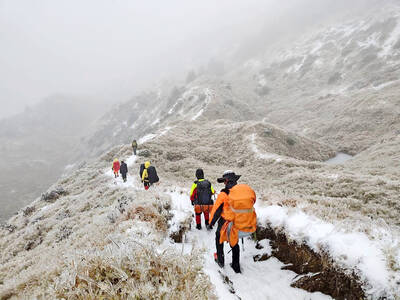Government officials and DPP lawmakers yesterday dismissed speculation that the ruling party is secretly launching the "cross-party alliance for national stabilization," despite signs that suggest otherwise.
Tsai Huang-liang (
The "cross-party alliance for national stabilization" was initiated by President Chen during the run-up to last year's legislative elections.
The proposed alliance would consist of a group of 120 lawmakers that would support the government's policy initiatives and follow four objectives set down by the president.
According to Chen, the four objectives are: switching to a single-member district, two-vote electoral system; opposing "one country, two systems"; implementing the 322 points of agreement reached at the Economic Development Advisory Conference; and implementing national social-welfare policies.
However the alliance has not come into being due to opposition from the KMT and PFP.
Speculation is mounting that the DPP has been making efforts to lure lawmakers across party lines in a bid to initiate the proposed alliance.
On Feb. 1, PFP lawmaker Chiu Chuang-liang (邱創良) took his party by surprise when he announced he was quitting the party on the day of the legislative speaker and vice speaker elections.
He also announced he would vote for the DPP's candidate for the vice speakership, Hong Chi-chang (
Chiu claimed that he was disappointed with the PFP's discrimination against Taiwanese party members, despite its claim of embracing ethnic unity.
Hong lost the race with 106 votes compared with 115 for the KMT's Chiang Ping-kung (
The second round was necessary because neither candidate managed to win an outright majority in the first vote.
On Feb. 22, KMT lawmaker Yang Jen-fu (楊仁福) announced he was withdrawing from KMT legislative operations after his request to join the legislature's economics and energy committee was denied.
He also accused KMT legislative whip Lin Yi-shih (
Eight-term KMT lawmaker Hung Chao-nan (
The position became vacant after Hong Yuh-chin (
Hung, who has served as a deputy executive director of the committee for many years, has expressed a keen interest in taking over as the executive director.
Instead of appointing Hung to succeed Hong, however, the party offered the position to Tseng Yung-chuan (
Independent lawmaker Kao Meng-ting (
But Yao Chia-wen (
"But it doesn't necessarily mean that the alliance will not be formed in the future if the DPP enjoys a pleasant and steady cooperative relationship with other legislative caucuses on certain issues," he said.
Tsai, a former chief executive of the DPP legislative caucus and a member of the party's Justice Alliance (正義連線) faction founded by the president, said that the DPP caucus is indeed offering certain incentives to lure lawmakers across party lines to either join the party caucus or participate in party operations.
"Since we don't have many resources available, the only thing we can offer is that they'll get priority nomination should they join the DPP caucus," Tsai said.

Trips for more than 100,000 international and domestic air travelers could be disrupted as China launches a military exercise around Taiwan today, Taiwan’s Civil Aviation Administration (CAA) said yesterday. The exercise could affect nearly 900 flights scheduled to enter the Taipei Flight Information Region (FIR) during the exercise window, it added. A notice issued by the Chinese Civil Aviation Administration showed there would be seven temporary zones around the Taiwan Strait which would be used for live-fire exercises, lasting from 8am to 6pm today. All aircraft are prohibited from entering during exercise, it says. Taipei FIR has 14 international air routes and

The Ministry of National Defense (MND) today released images of the military tracking China’s People's Liberation Army (PLA) movements during the latest round of Chinese drills around Taiwan. The PLA began "Justice Mission 2025" drills today, carrying out live-fire drills, simulated strikes on land and maritime targets, and exercises to blockade the nation's main ports. The exercises are to continue tomorrow, with the PLA announcing sea and air space restrictions for five zones around Taiwan for 10 hours starting from 8:30am. The ministry today released images showing a Chinese J-16 fighter jet tracked by a F-16V Block 20 jet and the

Snow fell on Yushan (Jade Mountain, 玉山) yesterday morning as a continental cold air mass sent temperatures below freezing on Taiwan’s tallest peak, the Central Weather Administration (CWA) said. Snowflakes were seen on Yushan’s north peak from 6:28am to 6:38am, but they did not fully cover the ground and no accumulation was recorded, the CWA said. As of 7:42am, the lowest temperature recorded across Taiwan was minus-5.5°C at Yushan’s Fengkou observatory and minus-4.7°C at the Yushan observatory, CWA data showed. On Hehuanshan (合歡山) in Nantou County, a low of 1.3°C was recorded at 6:39pm, when ice pellets fell at Songsyue Lodge (松雪樓), a

NO SHAME IN RETREAT: Hikers should consider turning back if the weather turns bad or if they do not have sufficient equipment, the Taroko park headquarters said Two people died of hypothermia over the weekend while hiking on Hsuehshan (雪山), prompting park authorities to remind hikers to bring proper equipment and consider their physical condition before setting out in the cold weather. Temperatures dropped over the weekend, bringing snow to high altitudes in Shei-pa National Park. One hiker, surnamed Lin (林), who on Friday was traveling with a group of six along the Hsuehshan west ridge trail, lost consciousness due to hypothermia and died, the Shei-pa National Park Headquarters said. On Saturday, another hiker, surnamed Tien (田), in a group of five on the southeast of the west